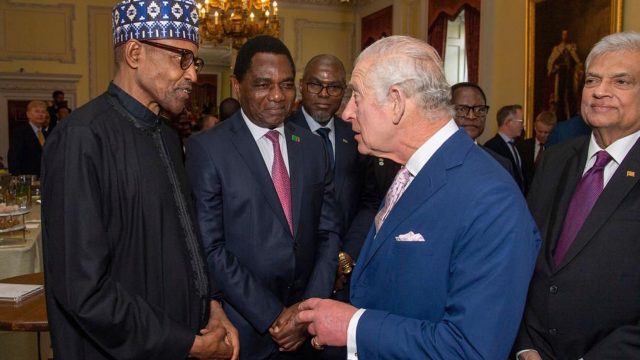
President Buhari has asked the Senate to approve a fresh loan request of $800 million from the World Bank, despite the public outcry that has greeted the move.
The World Bank facility, government said, is aimed at providing succour to the poorest of the poor upon removal of the petrol subsidy that is slated to come into force two days after Buhari’s exit.
The Guardian had reported that the facility approved sometime last year was secured with the country’s special drawing right (SDR) with the International Monetary Fund (IMF) and that its payment would extend to 2051.
About $53 million out of the $800 million will be spent on hiring staffers, office administration, committee overheads and sundry matters relating to the fund administration and disbursement.
President of PENGASSAN, Festus Osifo, had urged the Federal Government to allow the next administration to decide on the loan.
But Buhari, in a letter read by Senate President Ahmad Lawan, at the commencement of a plenary session yesterday, ignored the advice, requesting the Senate to approve the facility, which he said, would be utilised to scale up the National Social Safety Net Programme.
The request came as the Director General of the Budget Office of the Federation, Dr. Ben Akabueze, criticised the continuous accumulation of public debt, saying the lean revenue does not support the move.
Speaking at the ongoing induction programme for lawmakers elected into the 10th National Assembly, Akabueze lamented: “We now have very limited borrowing space, not because our debt to GDP is high, but because our revenue is too small to sustain the size of our debt. That explains our high debt service ratio.
“Once a country’s debt service ratio exceeds 30 per cent, that country is in trouble and we are pushing towards 100 per cent. That tells you how much trouble we are in.
“We have limited space to borrow. When you take how much you can generate in terms of revenue and what you can reasonably borrow, that establishes the size of the budget. The next thing would be to pay attention to government priority regarding what project gets what. The budget is not a shopping list. In the past, the budget only contained expenditure, but we have changed that.”
The Budget Office boss also noted that while the size of FG’s appropriation for 2023 created some excitement, the aggregate budget of all governments in the country amounts to about N30 trillion
“That is less than 15 per cent in terms of ratio to GDP. Even on the African continent, the ratio of spending is about 20 per cent. South Africa is about 30 per cent, Morocco is about 40 per cent. About 15 per cent is too small for our needs.
“That is why there is fierce competition for the limited resources. That can determine how much we can relatively borrow,” Akabueze lamented.
In the loan approval request, Buhari said the facility was an extension of the unconditional cash transfer being implemented by the FG.
The president stated that the funds, when approved, would be sent to the bank accounts of the identified beneficiaries.
Buhari told the lawmakers that the Federal Executive Council (FEC) had approved a request to obtain the loan, noting that he was waiting for the approval of the Senate before going ahead with processing the loan.
The letter dated May 2, 2023 and addressed to the Senate President, Ahmad Lawan, reads: “Please note that the Federal Executive Council (FEC) approved an additional loan facility to the tune of $800 million to be secured from the World Bank, for the National Social Safety Net Programme (NASSP).
“The Senate may wish to note that the Programme is intended to expand coverage of shock-responsive Safety Net support among the poor and vulnerable Nigerians. This will assist them in coping with the costs of meeting basic needs.
“You may wish to note that, the FG under the conditional cash transfer window of the programme will transfer the sum of N5, 000 per month to 10.2 million poor and low-income households for six months with a multiplier effect on about 60 million individuals. In order to guarantee the credibility of the process, digital transfers will be made directly to beneficiaries’ accounts and mobile wallets”
“The NASSP being a social intervention programme will stimulate activities in the informal sector, improve nutrition, health, education and human capital development of beneficiary households.
“Given the above, I wish to invite the Senate to kindly approve an additional loan facility to the tune of $8OO million to be secured from the World Bank for the National Social Safety Net Programme (NASSP).”
Meanwhile, the FG is yet to open discussion with the organised labour movement on the percentage of the facility that would be used to provide mass transit buses for workers and other social interventions.
Some civil society organisations (CSOs) have also queried the insistence of the government on taking the loan.
Civil Society Legislative Advocacy Centre, (CISLAC) through its Executive Director, Auwal Musa-Rafsanjani, said borrowing to fund post-fuel subsidy removal palliative is strange, noting: “If the fuel subsidy removal process has been suspended as announced by the finance minister after the NEC meeting at the end of April, then the government should return the borrowed money because what are we taking the loan for?”
The Minister of Finance, Budget and National Planning, Zainab Ahmed, had disclosed that the $800 million loan secured from the International Bank for Reconstruction and Development (World Bank) was to provide post-petroleum subsidy palliatives for over 50 million Nigerians, ahead of June 2023.
They said the $ 800 million formed the first tranche of palliatives ready to be disbursed to 10 million households in the form of cash.
The minister had explained: “There is a provision (of the Petroleum Industry Act) that says 18 months after the effectiveness of the Petroleum Industry Act (PIA) that all petroleum products must be deregulated. That 18 months takes us to June 2023.”







